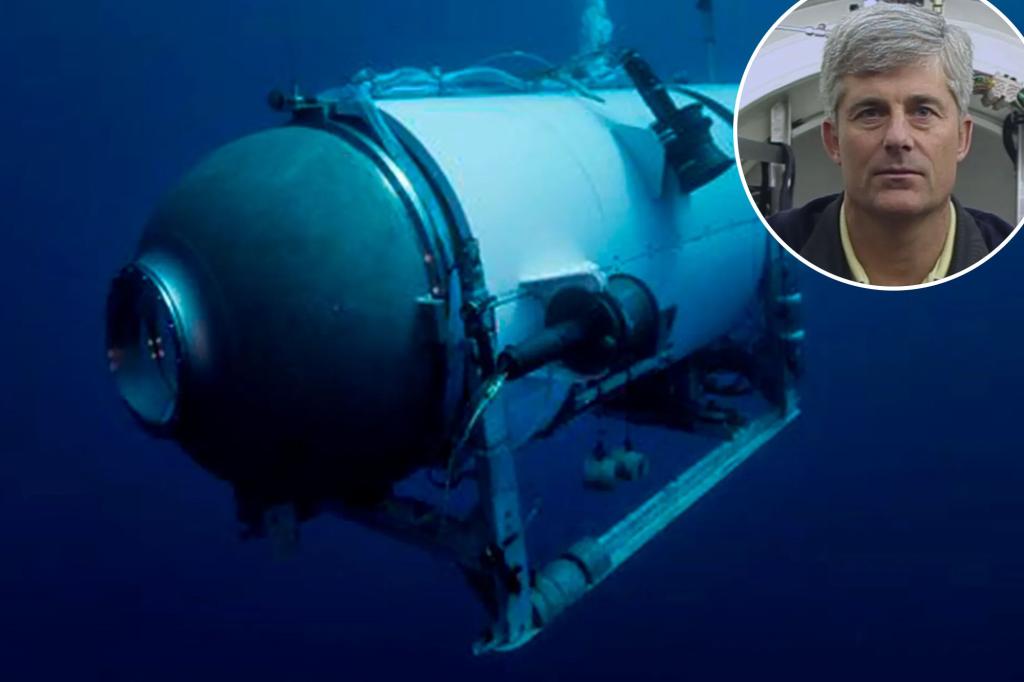A damning new documentary condemns Stockton Rush, the founder and CEO of OceanGate, the defunct company whose Titan submersible imploded in the Atlantic Ocean June 2023.
Former employees allege in “Titan: The OceanGate Disaster” on Netflix that their boss’ self-absorption and consistent willful negligence tragically led to the death of the five passengers, including Rush — a news story that captured the entire world’s attention for days.
“I worked for somebody that is probably [a] borderline clinical psychopath,” said former OceanGate engineer Tony Nissen.
“He wanted to be a Jeff Bezos or Elon Musk,” said Bonnie Carl, director of finance and administration, in the doc. “He referred to those guys as ‘big swingin’ dicks,’ and he loved that term and used it all the time.”
Engineering project manager Emily Hammermeister added that repeatedly expressed safety concerns by workers with years of expertise fell on deaf ears and Rush’s tunnel vision.
“Stockton was just so set on getting to the Titanic that nothing that anybody said made much of a difference,” she said.
Rush was a wealthy California-born engineer who loved “Star Wars” and “Star Trek.” He co-founded OceanGate in 2009 with the goal of bringing deep sea exploration to the public — especially dives to the Titanic.
In pursuit of his pipe dream, he decided to create the first submersible made from carbon fiber, a strong and cheap material consisting of many small strands.
“It’s not like metal,” said Wired journalist Mark Harris, who profiled Rush. “You know, titanium is extremely well understood. Carbon fiber is far more idiosyncratic in that the little fibers inside there can snap.”
Knowing the risks, OceanGate engineers built sensors into the hull — a series of small microphones — to alert people in the sub if there were breaches to the carbon fiber so they could quickly surface. In theory.
“The monitoring system for the hull was something that was dreamt up by OceanGate to try and give some comfort to people who were asking too many questions,” said submersible operations expert Rob McCallum.
The film terrifyingly shows years of pressure tests conducted on the sub in which the hull cracked and the vehicle imploded. “Pop” noises of breaks are loud and frequent — portending the loss of life that was to come.
“I just can’t believe it,” Rush angrily reacted during a trial five years before their first dive. “We couldn’t even get past f–king 4,300 PSI.”
Eventually, Titan successfully reached the Titanic — in spite of persistent safety issues.
“It was a mathematical certainty that it would fail,” said McCallum. “So, having a dive or two or 10 to the Titanic is not a measure of success. And personally I will never understand how it survived the first test dives.”
Lochridge emailed Rush and others a safety report in 2018, and was called into a contentious meeting the next day. Rush recorded the interaction.
“I don’t want anybody in this company who is uncomfortable with what we’re doing,” said an irate Rush.
“We’re doing weird s–t here, and I am definitely out of the mold. There’s no question. I’m doing things that are completely non-standard. And I’m sure the industry thinks I’m a f–king idiot. That’s fine. They’ve been doing that for eight years. And I’m going to continue on the way I’m doing, but I’m not going to force people to join my religion if they don’t want to.”
Reacting to Lochridge’s report, an angry Rush told Nissen, his engineer, that “it would be nothing for him to spend $50,000 to ruin somebody’s life.”
“That changed my life in that company,” said Nissen. “I had to make sure nobody spoke up.”
Nissen, Lochridge, Hammermeister and Carl went on to all leave the troubling company.
Carl was pushed over the edge when Rush brazenly suggested she assume the role of lead pilot.
“Are you nuts? I’m an accountant,” she remembered thinking.
On June 18, 2023, one hour and 33 minutes into a dive, the Titan lost communication with the surface. A four-day search ensued and voracious news outlets displayed countdown clocks of when the sub would run out of oxygen.
Debris was finally discovered on June 22. The Titan had actually imploded the same day it ceased pinging. The passengers — Rush, Hamish Harding, Paul-Henri Nargeolet, Suleman Dawood and Shahzada Dawood — all died.
Hammermeister still feels shaken up by her association with OceanGate.
“I’ve reflected a lot on my time there,” she said.
“And my time there was not normal. I mean, I think back to the times where I was part of dives that happened. And thinking back how uncomfortable I felt bolting people into the sub. And so when that initial news article popped up and it said “Tourist sub lost in the Atlantic,” I knew right away it was OceanGate.”
Lochridge said the tragedy was a result of Rush’s narcissism.
“He wanted fame,” he said. “First and foremost to fuel his ego, fame. That was what he wanted. And he’s got it.”
